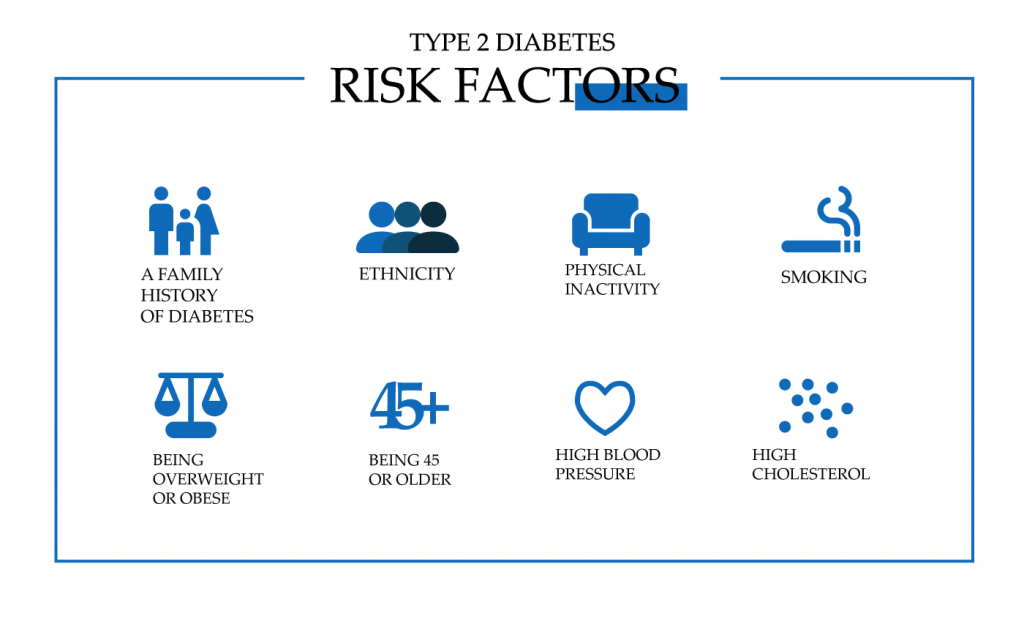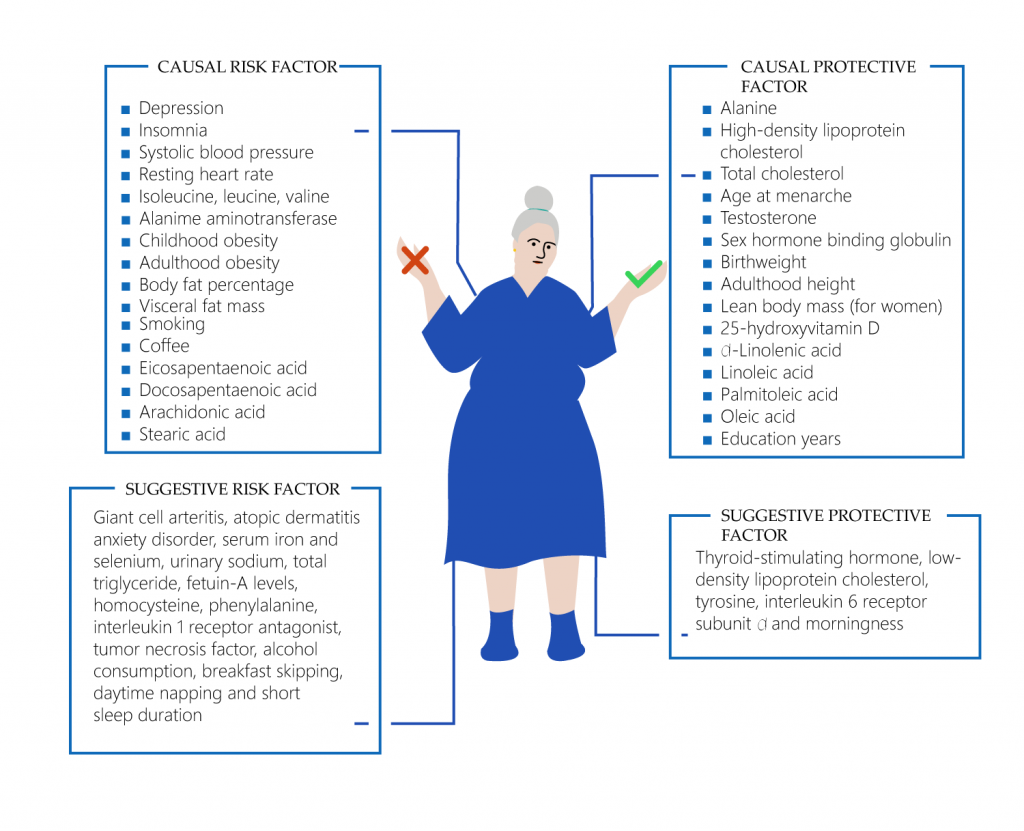Risk Factors for Type 2 Diabetes
Worry about your sugar levels? Or, think that your family history of diabetes may be reflected in your health? It might be a good worry since you may prevent the deterioration of your health. Today, one of the most common diseases among the modern population is diabetes. Type 2 diabetes is widespread in approximately 34M of Americans. Unfortunately, there is no known cure to get rid of this medical condition; however, one may prevent and manage it by knowing all the risk factors for type 2 diabetes. Learn more about the risks, tests involved in detecting the disease, as well as prevention measures to live a healthier life.
What Are the Risk Factors for Type 2 Diabetes
Prior to starting the investigation of risk factors known for developing type 2 diabetes, one should understand that every case is individual, and you may be affected with diabetes type 2 caused by other factors. Type 2 diabetes is a disease that is manifested by one’s body’s inability to regulate glucose. As a result, a body accumulates too much sugar, and it, in turn, may negatively affect one’s immune system and cause other comorbidities.
So, what are the common risk factors for type 2 diabetes?
The Most Important Risk Factors for This Type

Below you may find the most common risk factors for type 2 diabetes. Keep in mind, they are just examples, and you may develop this medical condition by other causes. Ensure to speak with your healthcare provider to prevent them.
Weight
If you gained too much weight or struggle with it for a long time, you might be suffering from type 2 diabetes. Of course, it does not concern small alterations in one’s weight but obese conditions. You should immediately alert your doctor if you experience a radical raise in your weight that you cannot solely manage. Overweight people are the ones who become linked to the risk factors for type 2 diabetes in most cases.
Fat Distribution
As per one study, there is a visible confirmation that fat distribution, including abdominal adiposity, is related to the onset of type 2 diabetes. Beyond that, adult women are known to be linked to having significantly-reduced lower-body fat. To ensure this condition does not lead to the developing of the disease, one should measure his/her BMI on a regular basis.
Inactivity
Those who follow an inactive lifestyle or spend most of their days sitting might be at great risk of suffering from many diabetes conditions. As per one study, inactivity has been significantly linked to the development of type 2 diabetes since an extremely sedentary lifestyle affects glycemic control.
Family History
If your family members have had a history of type 2 diabetes, you are most likely to be at risk as well. In your case, you should consult your doctor regularly to ensure you can detect the prediabetes stage, which is possible to manage without using insulin injections, etc.
Race and Ethnicity
As of now, race and ethnicity are known to be risk factors for type 2 diabetes that may potentially lead one to the development of other diseases. In particular, it concerns Latinos, Hawaiians, Afro-Americans, etc.
Blood Lipid Levels and Other
One more risk factor is blood lipid levels. This medical condition is greatly related to the linked plasma lipid alterations, which, in turn, involve reduced HDL cholesterol levels and altered amounts of triglyceride.
The other two common strongest risk factors for type 2 diabetes are a history of stroke and depression. And, some doctors suggest that viruses and infections may also affect the onset; however, the evidence exists only with animal models. In all cases, you should always visit a dedicated doctor to overlook your system, organs, hormone level. It will help determine the diagnosis promptly.
Risk Factors for Type 2 Diabetes

All the risk factors for type 2 diabetes may also be divided into patients’ groups, including adults, youngsters, and pregnant patients.
In Adults
As for risk factors for type 2 diabetes in adults, they are normally obese and have poor lifestyles. Beyond that, adults may develop this medical condition when they have certain skin conditions or symptoms. In particular, it concerns acanthosis nigricans, which manifest themselves in the dark-colored and thick neck/armpit skin.
In Kids and Teens
Alongside behavioral known risk factors for type 2 diabetes, such as depressed strange movements or reactions, a kid or teen may develop type 2 diabetes because of being born by a mother with gestational diabetes. Another factor is when a kid or teen comes from a family whose race is African American, Latino, Asian American, etc.
During Pregnancy
Pregnant women may develop gestational diabetes if they have much weight, if they are currently in the prediabetes stage, or have had previous pregnancies associated with gestational diabetes. Pregnant women and women who plan to become pregnant and are worried about their family history of diabetes should be checked by doctors utmost to ensure the fetus is safe.
Testing for This Type
If you want to learn more about risk factors for developing type 2 diabetes or exclude any possibility of suffering from the disease, you may test yourself for this type in clinics or by buying a test for home applications.
A typical examination is ongoing through the (A1C) test. It shows the sugar levels in your bloodstream over the past 2-3 months.
The indications of A1C are:
- 5,7% – good (no diabetes);
- 5,7%-6.4% – prediabetes stage;
- 6,5% – diabetes.
Another method to check your sugar levels is to request a regular blood sugar test or a fasting one.
The indications are the following:
- 100mg/dl – good (no diabetes);
- 126mg/dl – diabetes.
One of the additional measures to test is to request an oral glucose tolerance medical examination. It is rarely used; however, it perfectly fits pregnant patients. The results of this test are the following:
- less than 140mg/dl – good (no diabetes);
- 140-199mg/dl – prediabetes stage;
- 200mg/dl and more – diabetes.
To detect risk factors for type 2 diabetes in most adults, one may also go for autoantibodies tests. Autoantibodies are usually absent with type 2 diabetes. Nevertheless, your doctor will recommend the best testing for your particular case.
How to Prevent Type 2 Diabetes
If you want to learn how to prevent type 2 diabetes, feel free to follow the recommendations from the below-mentioned table. Please note, the recommendations are also subject to change, and they may either fit your particular case or not.
Preventing risk factors for type 2 diabetes:
| Stabilize your weight | As was mentioned above, you should be very attentive to your BMI and abdomen fat. You may either consult a dietician or reduce the number of sweets you eat. |
| Follow a balanced diet | Diet is among nutritional common risk factors for type 2 diabetes. Minimize saturated fats and sweets. Try to eat less fast food, but if possible, replace it with healthier alternatives. |
| Manage your alcohol consumption | Logically to assume, alcohol contains many calories. If you drink a lot, your weight may radically go higher, and you will have health problems. |
| Cut down the number of cigarettes you smoke | It is better to quit smoking; however, a person addicted to nicotine may find it hard. Speak to your doctor about quitting this habit with no harm to your body. |
| Drink more water | Water is the best assistant to one’s metabolism. If you drink a lot of water, you partially help yourself avoid gaining much weight. |
| Regularly check your blood sugar | Make a habit of checking your blood sugar to detect the prediabetes stage if you have a family history with this medical condition. |
That’s it. You should always remember that prevention and management of the prediabetes stage and awareness of all risk factors for diabetes type 2 is the easiest way to live a healthy life. If you have already been diagnosed with type 2 diabetes, start your treatment as soon as possible.


























